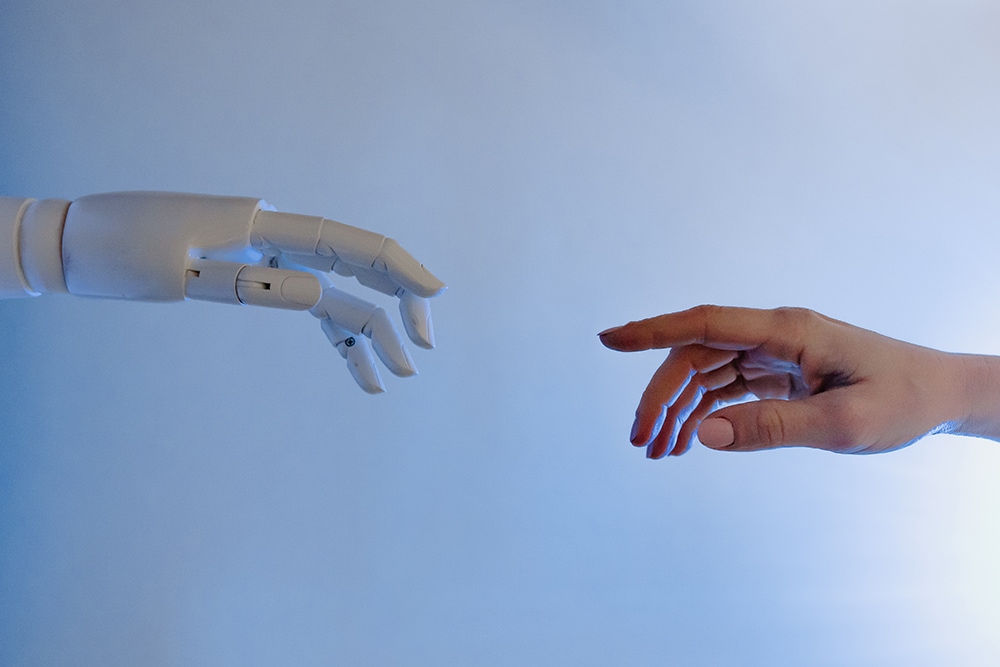Hundreds of articles discuss if ChatGPT and the development of artificial intelligence (AI) is the end of our civilization. Apple just launched their Vision Pro, the first generation of spatial computing, and theoretical physicists like Michio Kaku are discussing the future of immortality and virtual existence as our inevitable destination.
Integration of new technology and innovation has always felt terrifying, yet historically, humans have utilized these tools without perishing. One trend, however, that this technological advancement has spread into popular culture faster than its development, has to do with altering norms of engagement and emotional bandwidth of human-to-human interactions. In essence, we are becoming different, not because robots are taking over our jobs, but because we no longer engage with each other as we used to. This trend toward thwarted relational capacity might lead us to the precipice of humanity’s inevitable demise before computers learn to control us.
Twenty or so years ago, before we learned to hide behind a computer screen, we only engaged in person. The essence of human nature was that we were intrinsically relational beings, and our interactions were visceral. If we offend another, we see their facial expressions change, hear their tone of voice shift and the cadence of speech alter, our mirror neurons activate, and our bodies resonate with the other person. Spending real time with someone engaging provides an exhilarating emotional experience. We laugh and have heated discussions. We raise our voice and our body temperature goes up. Then we calibrate and repair collectively. This process is a tremendous exchange of nonverbal sensory energy. Before we could hide behind avatars and fake names, we were still tribal beings accountable to one another. When we engage authentically, we trigger powerful emotions. We charge and drain each other with energy, giving us a sense of attunement to our fellow humans. A tribal human is relational; a digital human, less so.
We relentlessly strive toward a more tolerant and just society. In many ways, we have reached some of those goals (my children have access and are more understanding of things than I even had the language for at their age). Yet we have also become emotionally more disconnected from one another. This is evident in many aspects of our social functioning, especially youth culture. Teenagers opt for virtual interactions over in person relationships. They are less interested in individuating to explore their worlds because they are exploring online. This generation has less sex than any other, yet they are more inundated with sexual content than ever before. We live in a culture of inauthenticity, over-labeling, and emotional blunting. Half of the time, we talk to bots without even knowing it, altering our social fabric.
In a world where everything can be and is for sale, we have a world of overpackaged lies. The self-help industry itself is an overpackaged lie. Endless memes that quote inner peace and define complex concepts in simplified sentences, TikTok gurus that teach you relationship tricks in less than a minute, and books that claim to fix your childhood trauma in 10 steps. We have words for every uncomfortable experience and every situation. We have a generation of over-therapized individuals who have been taught how to label but not how to connect.
When a feeling becomes a thought, it is no longer a feeling. Emotions versus thoughts are processed by different areas in the brain; thus, they are also processed at different speeds. When we prematurely label an emotional experience, we dampen the process. The result is an exchange of labels without meaning. We do not derive meaning from a method of rational computation; it is distilled from emotion, hence, the difference between a robot and a human. In a fast-paced digital world, however, there is less time to process a tremendous volume of input emotionally. And this very fact is the precipice of human extinction. We are slowly becoming unfeeling beings. However, we cannot distinguish meaning from meaningless, and a meaningless world is no world at all.
For the sake of our survival, do not strive for fake inner peace — there is no peace here. Your every cell is fighting, so get mad when things are wrong, do not look for apathy. Learn to sit in the discomfort of your own skin. Do not strive to be safe, for it is dangerous to live. spt







Comments